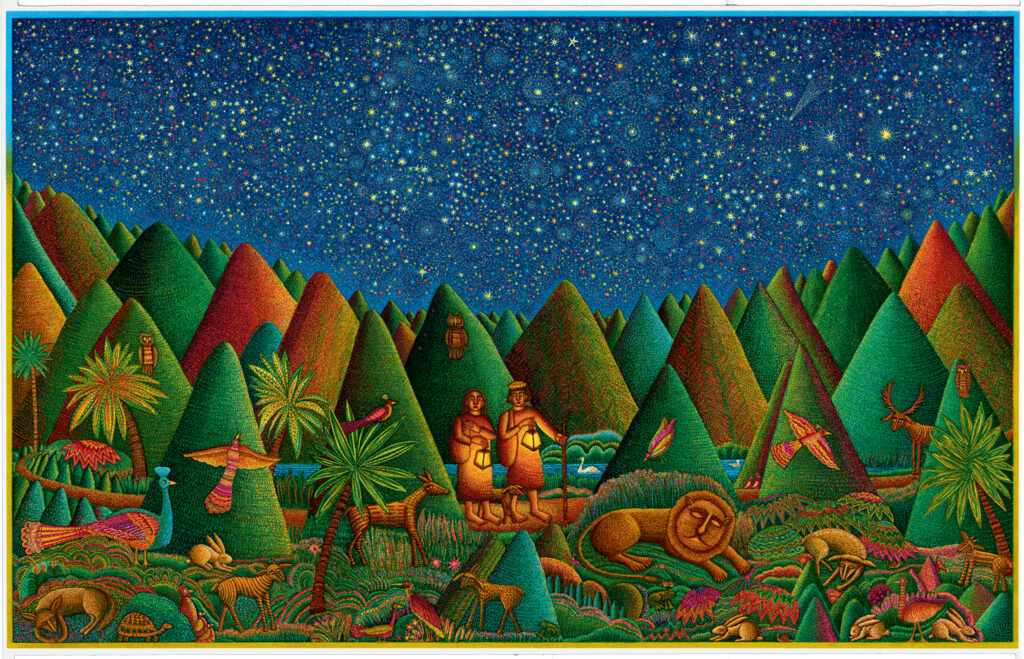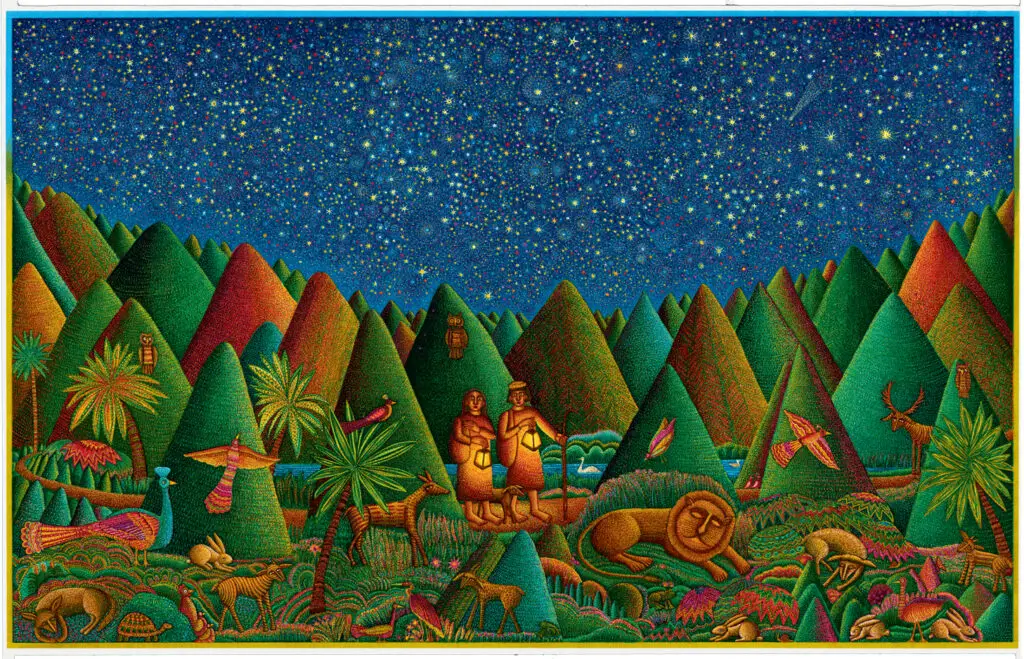What does resurrection look like in the here and now of our daily lives? How is God calling you to embody that resurrection for others?
It was winter in Jerusalem. The people had gathered at the temple to celebrate the Festival of the Dedication.
On this Sunday in Eastertide, the lectionary sends us back to the middle of the Gospel of John, before Jesus’ death and resurrection. Here, he is wandering around the temple during a time set apart each year to remember a moment of Jewish history and faith.
Roughly two centuries before Jesus, the temple had been seized by King Antiochus IV. Jewish practices were outlawed. Sabbath observance was banned. Scrolls were burned. And the altar in the temple, once the center of their worship, was desecrated with offerings to other gods. Those who resisted were met with violence, imprisonment, and death.
Eventually, a group of the faithful, led by Judah Maccabee, rose up and reclaimed what had been lost. They purified the temple, rebuilt the altar, relit the menorah, and rededicated the space to God. That act of resistance and restoration became a story the community would tell again and again during the Festival of the Dedication.
This festival, today known as Hannukah, was a reminder that even when faith is threatened, God’s presence and the people’s perseverance endure.
So when Jesus enters the temple during that festival, it’s not just a passing detail. The people around Jesus aren’t simply curious about who he is; they are standing in the middle of a festival that remembers how easily dignity and humanity can be stripped away and how much courage it takes to reclaim what is holy. They ask him, “How long will you keep us in suspense?”, which, in the original Greek, reads more like, “How long will you keep holding our lives in your hand?”
The people gather around Jesus and ask him to tell them if he is the Messiah. But they’re not seeking a title so much as they’re seeking a promise. They want to know whether he is the one who will finally see them, protect them, and restore what’s been lost.
Jesus, being Jesus, answers them like this. He says, “My sheep hear my voice. I know them, and they follow me.”
In the Jewish tradition, shepherding was a symbol of kingship. King David was literally called from tending sheep to rule over Israel. In 2 Samuel, we hear God’s words: “You shall shepherd my people Israel.” This shepherd – this king – knows the sheep, lead them gently, protect them from harm, and bring them home.
But Israel’s leaders hadn’t always lived up to that calling. That’s why the prophet Ezekiel condemned the false shepherds who had abused their power and left the people scattered and vulnerable. And so out of that comes a promise from God through Ezekiel, “I myself will search for my sheep. I will seek them out.”
So when Jesus picks up this language and speaks as a shepherd, one who knows his sheep and whose voice they recognize, he is stepping into that understanding. This is a fulfillment of a promise.
Where leadership has failed, Jesus will not. Where others have scattered, Jesus will gather. Where the world has treated them as disposable, Jesus will claim them as his.
This’s the Shepherd Jesus is.
Then, Jesus makes another promise during the festival:
I give them eternal life, and they will never perish. No one will snatch them out of my hand.
For us, eternal life has been understood as life after death. But in Jesus’ time, that’s not how it would have been understood.
His listeners, first-century Jews living under Roman occupation, weren’t primarily thinking about a place beyond this earthly life that we might now refer to as heaven. They were thinking about liberation, restoration, and the long-awaited arrival of God’s kin-dom in the here and now. Eternal life wasn’t about leaving earth but more so about seeing the world made right.
Jesus knowing his sheep is the beginning of eternal life; not rules or status or perfection, but simply recognition, intimacy, and belonging. For people who had been pushed to the margins, for people living under empire, for people wondering whether God still saw them; it was everything.
To say that no one can snatch them out of his hand wasn’t just comforting. It was defiant. It meant that no ruler, no oppressor, no religious gatekeeper had the final say. If they belonged to the Shepherd, they were safe and secure.
And that’s still true.
Eternal life isn’t something we wait for after death. It’s the life we begin to live when we trust the voice that calls us by name. It’s life in the presence of the Shepherd who gathers us, holds us, and does not let go.
I believe we saw a glimpse of that just last Saturday, right here in our own Presbytery.
As part of a denomination-wide vote, our Presbytery joined many others across the country in voting to approve an amendment to the Book of Order that adds sexual orientation and gender identity to the list of identities protected from discrimination in the life of the Church. And our Presbytery was not alone. In fact, a majority of Presbyteries have already voted in favor of this change, which means the amendment will be officially added to our Book of Order at next summer’s General Assembly.
It may look, on the surface, like a minor decision. But it is more than that. It is a witness. A visible sign of what it means for the Church to listen for the voice of the Shepherd and then to respond faithfully to that voice.
At a time when LGBTQIA+ people are being singled out in harmful and dehumanizing ways through legislation, rhetoric, and fear; here is the Church saying something different.
And that message matters! Not just for LGBTQIA+ community, but for everyone who has ever wondered if they truly belong. Everyone who has questioned whether they have a place in God’s Church. Everyone who has hoped that God’s love might be deeper than they’ve been taught to believe.
In our tradition, we trust that the will of God is discerned through the prayerful, gathered life of the Church. And so when Presbyteries across the country make decisions and those decisions are in the majority, we are bearing witness to the Spirit still at work among us.
We are leaning into the promise that eternal life is not reserved for the future. It’s something we’re called to live into now.
And it’s one thing to believe that resurrection is possible out in the world.
It’s another thing to believe that resurrection is possible for you.
That you, in whatever valley you’re walking through, whatever grief or uncertainty you carry, whatever ache still feels unanswered; you are still being held by the Shepherd’s hand.
Nothing will remove us from God’s grasp. Not doubt. Not exhaustion. Not fear. Not failure. Not grief. Nothing!
We don’t always feel that. There are days it’s hard to hear the Shepherd’s voice. There are seasons when it feels like we’re wandering and lost, not sure what’s next and whether goodness and mercy will follow.
But Jesus doesn’t wait for our certainty before claiming us. Jesus doesn’t wait for us to have it all figured out before offering eternal life. The promise rests not on how firmly we can hold on, but on how firmly Jesus refuses to let go.
The Shepherd who gathers the Church is the same Shepherd who gathers you.
The same voice that calls communities into belonging is the voice that still calls your name when you need to know that you too are part of God’s kin-dom. The same hand that holds the community in love is the hand that holds you when everything feels uncertain.
Eternal life is not the absence of pain. It’s the presence of God in the midst of it. It’s the promise that even now, resurrection is unfolding in you.
You are not forgotten. You are not outside the reach of grace. You are not too far gone, too lost, or too late. You are known. And you are valued. And the Shepherd who claims, gathers, provides, protects, and holds is still here.
It’s easy to think of resurrection as a single, dazzling moment: a stone rolled away, an empty tomb, a sudden flood of joy after so much pain. And sometimes it is!
And resurrection looks more subtle then that. It looks like a small act of courage. Inclusion with compassion. A room where people are finally seen. A table set for someone who never thought they’d be invited.
Sometimes resurrection looks like being reminded that you are still held. That your life is not a mistake. That even when you feel forgotten or afraid or filled with regret, there is a Shepherd who knows you. A Shepherd who has already claimed you. A Shepherd who will not let go.
Not just that there will be life after death. But that there is eternal life right here, right now, in this messy and beautiful and complicated world.
And so wherever you find yourself today, whether you feel close to the Shepherd or far away, whether you are walking in green pastures or stumbling through the valley, know this:
You are known. You are loved. You are already being gathered into the promise of resurrection. The promise is not far off. It’s unfolding. Right here. Right now. And no one, no thing, no injustice will ever take that from you. Nothing will remove you from God’s tender care.
In a time of where it feels like dignity and humanity can be stripped away so easily, Christ our Shepherd gives us the hope and the promise that God’s Church is different.
In the name of the Father, Son, and Holy Spirit. Amen.


